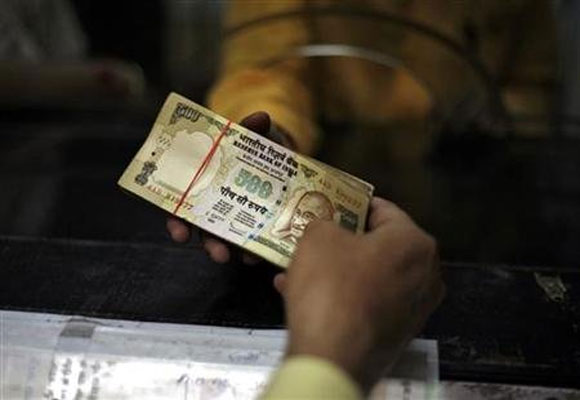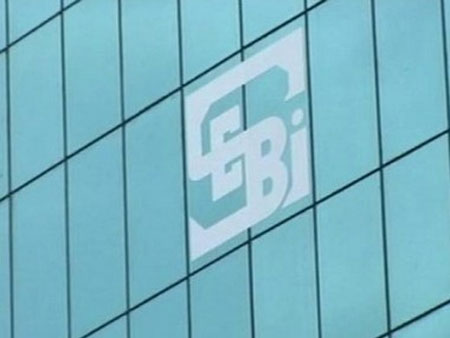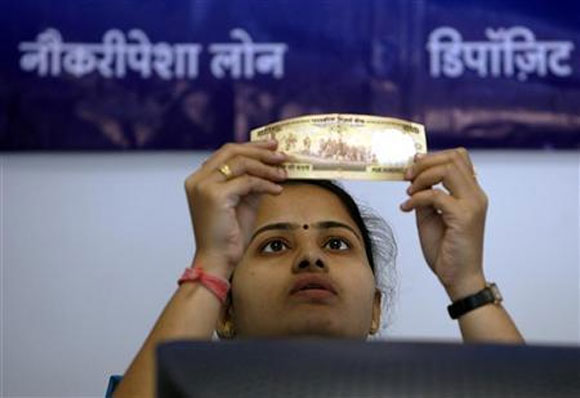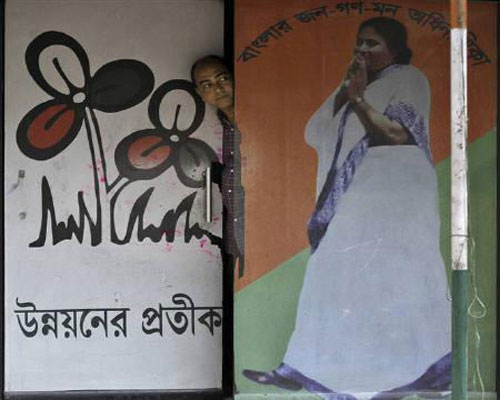Photographs: Illustration: Uttam Ghosh/Rediff Namrata Acharya
Small firms raising deposits in disguise of advances for unknown projects referred to as money market companies in common parlance.
Investopedia defines money market as "a segment of the financial market in which financial instruments with high liquidity and very short maturities are traded." In rural Bengal, however, "money market" has found a new definition.
Small companies in the business of raising deposits in disguise of advances for unknown projects are referred to as money market companies in common parlance.
"I will do anything, but never work in the money market," is what one of the protesters, who has burnt his fingers in the scam. But till recently, the lure of big returns is what motivated more than three lakh agents. Likewise for Saradha promoter, Sudipta Sen, who has said in his letter to the CBI that he ventured in the business as he was told that there was thousands of crores to be made.
Click on NEXT for more...
In Bengal's grey 'money market', Saradha is just one
Photographs: Illustration: Uttam Ghosh/Rediff
The modus operandi?
Saradha Realty is just one of the companies raising small deposits from investors. The number of such companies could actually be 700 or 800. The ones already under the scanner are those that most people know of , but there are now "para" chit funds, or neighbourhood companies that have ventured in the money market.
It is yet to be examined if running such schemes is legal or illegal, as the whole mechanism involves raising deposits as advances. "These are no specific financial instrument, but only some disguised way of raising money," says Mamata Binani, past chairman, Institute of Company Secretaries of India (ICSI), eastern region.
There are no brochures, no mention of the term deposit, and even the agents are trained to show brochures to only interested clients. A casual enquiry about the schemes in offices is not entertained.
"We have deposited the requisite amount to Sebi for certification. Soon we will be under Sebi," said one agent when asked about the details of a fixed deposit scheme advertised on a blog.
Another agent of a similar company said, the government of India was a shareholder so the investments were absolutely safe.
Click on NEXT for more...
In Bengal's grey 'money market', Saradha is just one
Photographs: Courtesy, Rose Valley
Most of the companies raise deposits in the disguise of advances for unknown real estate projects or booking hotel rooms. The companies offer three options : fixed deposits, monthly interest schemes and recurring deposits. There is no stated rate of interest, only promises of double the money in five years' time.
A snapshot of what some companies are offering explains the situation.
Rose Valley Holiday Membership Deposit Plan: In five years and ten months, the investment will double. In eleven years and three months it will be five times of the investment. The certificate says that the money is invested for booking a room in one of the hotels of Rose Valley, but at the time of maturity returned against cancellation.
In a public advertisement Rose Valley has said, "The current scenario and turmoil in West Bengal regarding a finance company reached its lowest when some hooligans attacked, ransacked and looted our Tamluk office thinking we are under the same strata. It is another move to blemish our clean image."
Click on NEXT for more...
In Bengal's grey 'money market', Saradha is just one
Image: Interior of a Prayag resort.Photographs: Courtesy, Prayag Group
Prayag Infotech Hi-Rise Limited: In five years and eight months, the deposits will double, while in eight years and three months it will multiply three times, in 11 years five times.
Alchemist Infra Realty Ltd sells plots to investors. The brochure says in six years of development tenure, the value of the plot is expected to double. The agreement says, any dispute will be settled under the provision of Arbitration and Conciliation Act, 1996. Alchemist's Chairman Emeritus is K D Singh, another TMC MP.
Click on NEXT for more...
In Bengal's grey 'money market', Saradha is just one
Photographs: Reuters
Regulations
Originally, small companies used to raise money from the public by making small societies that raised money through private placement of debentures - a crude instrument that had its genesis in the rural areas, according to Mamata Binani, past chairman, Institute of Company Secretaries of India (ICSI), eastern region.
Till 2011, most companies used to raise money by way of debentures or shares, offering as high as 20% return on investment, almost double the rate of interest in bank.
However, under Section 67 of the Companies Act any issue of preferential shares to more than 50 people would be deemed as a public issue, requiring Sebi clearance.
"There cannot be a preferential issue of shares to millions of people," says Binani.
By 2011, the penetration of the companies had become so thick, and many were raising money in the name of the regulator. In December, the Reserve Bank of India had issued advertisements against two such companies--Sunmarg Welfare Society and Amazon Capital, clarifying that it does not give any guarantee to the investment options being floated by these two companies.
Click on NEXT for more...
In Bengal's grey 'money market', Saradha is just one
Photographs: Reuters
Sebi has initiated action against many small companies raising funds, particularly through debenture and collective investment schemes. For example, in an order dated March 26, 2013, Sebi has imposed a Rs 1 crore penalty on Rose Valley Real Estates and Constructions for not providing details sought by the market regulator for raising money through debentures illegally.
Last year in May, Sebi ordered a Kolkata-based company to wind up its existing collective investment schemes (CIS) with immediate effect, as it had no Sebi registration. The company had been raising money through an instrument called, "green bond."
Incidentally, at the peak of the furore over small savings, the company published advertisement in a local daily, that it had certificates to raise money through CIS and even called for recruitment of agents in the company. More recently, Sebi has issued an order cautioning investors against an instrument called, Flexi Potato Purchase Scheme, soliciting funds from the public promising returns of 20-100%.
Cheating of investors falls under one of the following laws : a) 'vanishing' after raising money through public offers; b) illegal collection of deposits in violation of Section 58A of the Companies Act, 1956; c) floating sham CIS in violation of SEBI Act; d) collecting money from public by posing as 'Non-Banking Financial Companies (NBFCs) in violation of RBI Act; e) and resorting to 'Ponzy' or money circulation schemes under the Prize Chits and Money Circulation Schemes (Banning) Act, 1978.
Click on NEXT for more...
In Bengal's grey 'money market', Saradha is just one
Photographs: Reuters
However, ironically, it is debatable if taking money as an advance, and giving back with interest on cancellation of a booking falls in any of the above category.
"There is no coordination among regulators. The first blame goes to banks. The banks should be given the responsibility of asking the basic question to companies with high value transaction that who is the regulator?" said J N Gupta, former executive director of Sebi.
In addition, it is often the lower returns from banks and other financial institution that often led investors to get lured by higher returns.
The extent of such flimsy schemes can be gauged by the fact that West Bengal, which has been traditionally a major contributor to the overall small savings mobilisation, has lost sheen.
Click on NEXT for more...
In Bengal's grey 'money market', Saradha is just one
Photographs: Reuters
Recently, West Bengal small savings development officers association demanded action against mushrooming chit fund companies in the east due to the steady decline in collections.
"Banks are working in extremely competitive environment, so there is a pressure to give business. However, banks do have a surveillance mechanism to put a tab on suspicious accounts," says Bhaskar Sen, former chairman and managing director of United Bank of India.
"In the end you cannot create something out of nothing. If such schemes like Saradha continue to flourish, by the effect of negative multiplier, it is the rural economy which will suffer, eroding demand in a state, which is already lagging behind in development," says Dipankar Dasgupta, former Professor of Economics, Indian Statistical Institute.
Certainly, at a time when West Bengal is neck deep in debt, a financial scam is the worst that could happen to precarious finances.










article